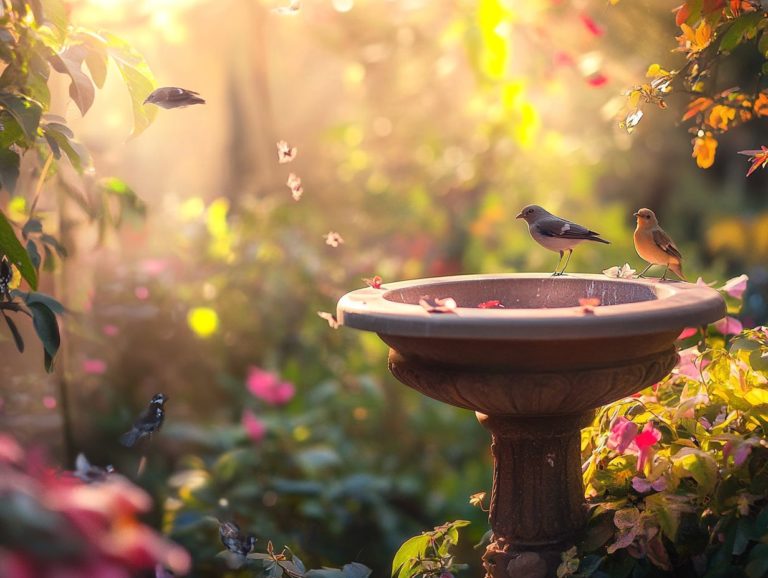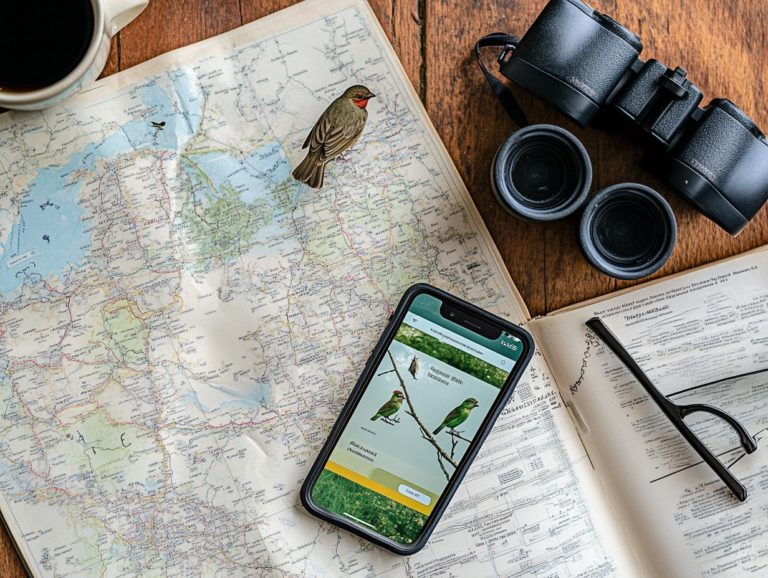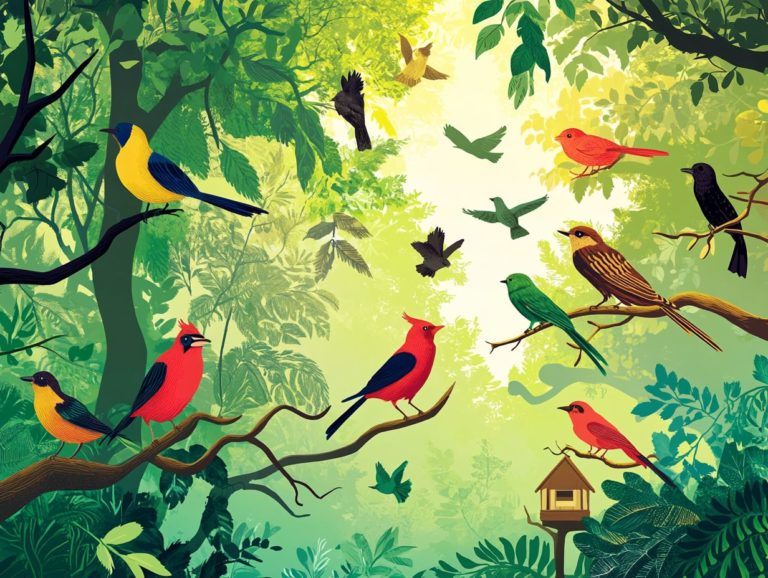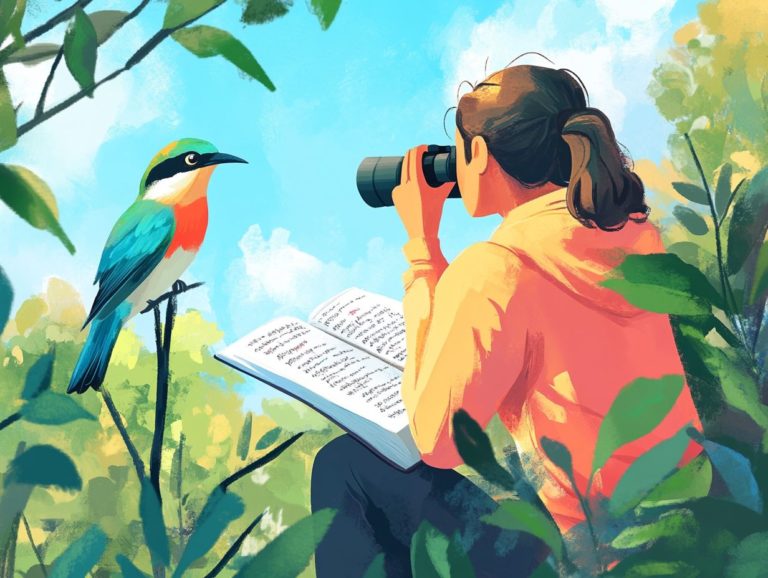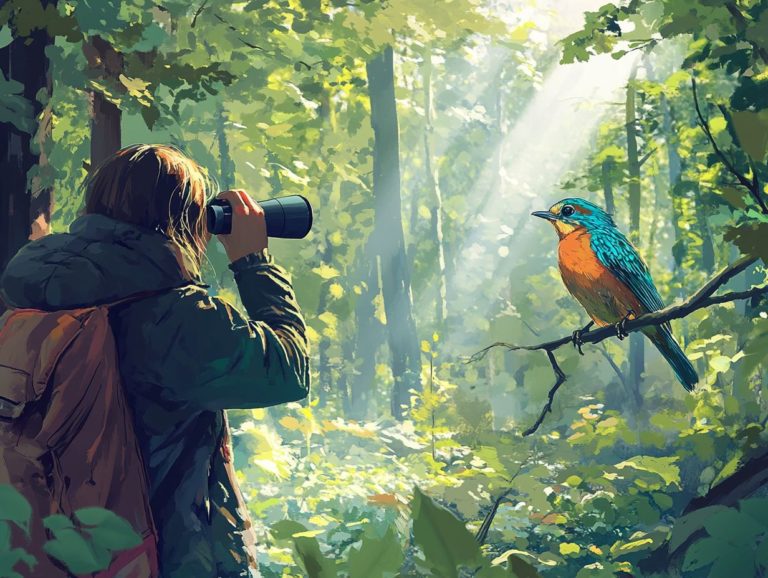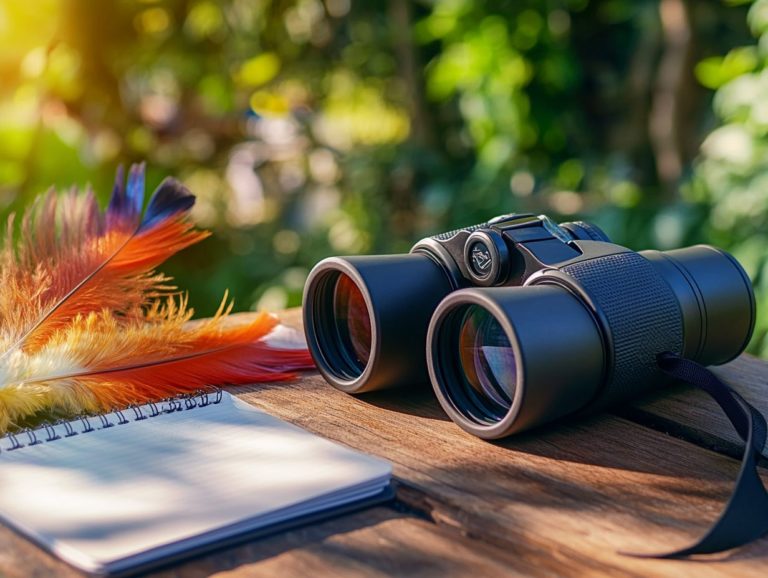How Do I Improve My Bird Watching Patience and Focus?
Birdwatching is an immersive experience that goes beyond being a passive hobby. It demands both patience and focus, whether you are a beginner or an experienced birdwatcher.
Understanding how to cultivate these skills can significantly enhance your time in nature. This article explores ways to develop patience through mindfulness practices and setting realistic expectations.
It provides tips to improve focus by minimizing distractions and using equipment effectively. Consistency and learning from seasoned birdwatchers can enrich your overall birdwatching experience.
Contents
- Key Takeaways:
- Understanding the Importance of Patience and Focus in Birdwatching
- Techniques for Improving Patience in Birdwatching
- Tips for Maintaining Focus While Bird Watching
- Practicing Patience and Focus in Bird Watching
- Frequently Asked Questions
- How do I improve my bird watching patience and focus?
- What are some common distractions during bird watching and how can I avoid them?
- How can I stay patient while waiting for a specific bird to appear?
- Is it normal to get frustrated or lose focus during bird watching?
- How can I make bird watching more enjoyable and relaxing?
- Is there a specific time of day that is best for bird watching?
Key Takeaways:
- Patience and focus are crucial for successful birdwatching.
- Practice mindfulness and set realistic expectations to improve patience.
- Minimize distractions and use equipment effectively to aid focus.
Understanding the Importance of Patience and Focus in Birdwatching
Patience and focus are essential qualities for those who engage in birdwatching. They enhance the experience of observing local bird species in their natural habitats, such as wetlands, grasslands, and urban parks.
Birdwatching fosters a connection with nature and deepens our understanding of bird behavior and migration patterns. Enthusiasts can leverage these skills to enrich their educational experiences by identifying bird calls and capturing wildlife through nature photography.
Why Patience and Focus are Essential Skills for Birdwatching
Patience and focus are two essential skills required for birdwatching. These abilities enable birdwatchers to observe and appreciate various bird species without disrupting their behaviors.
When birdwatchers find a suitable spot and remain still and quiet, they can witness stunning beauty, like a rare bird resting on a delicate branch or engaging in a courtship display. This calmness enhances the experience and helps develop the skills needed to identify different species by their sounds and physical characteristics.
Visual focus and patience are crucial for catching a fleeting glimpse of the vibrant blue of a Blue Jay. Blending into the environment and knowing when to stay quiet are important factors. The experience is enriched by recognizing behavioral patterns, such as feeding or nesting habits, which significantly increase the likelihood of spotting these birds.
Techniques for Improving Patience in Birdwatching
Improving patience in birdwatching is essential for enhancing the overall experience, especially when observing seasonal changes in local bird habitats and behaviors.
Mindfulness and breathing techniques help birdwatchers cultivate patience, keeping them calm and attentive. This mindset allows individuals to appreciate the finer details of the bird life.
Mindfulness and Breathing Exercises
Mindfulness and breathing exercises enhance focus and patience in birdwatching by increasing awareness of one’s surroundings. For instance, deep abdominal breathing calms the mind and helps individuals concentrate on the experience.
Sitting in silence to listen solely to the sounds of nature can significantly boost awareness. Additionally, body scans help release tension, enabling birdwatchers to remain still and patient while waiting to spot harder-to-find species.
Ultimately, these practices foster a deeper connection with nature, leading to more enriching experiences in the field.
Setting Realistic Expectations
Setting realistic expectations is crucial for cultivating patience in birdwatching. Understanding that not every outing will be thrilling helps mitigate disappointment.
When embarking on a birdwatching trip, consider the time of year and the local species present to ensure a rewarding experience. Being aware of local migratory patterns and peak times helps enthusiasts anticipate when they are likely to observe large and diverse populations of birds.
By establishing realistic expectations based on the environment and time constraints, participants learn to appreciate the experience itself, rather than just the number of birds seen. This approach fosters a calm mindset, allowing them to enjoy quiet moments in nature while waiting for brief encounters with birds.
Get ready for a thrilling birdwatching adventure! Don’t miss your chance to see these spectacular birds!
Tips for Maintaining Focus While Bird Watching
Focus is essential for identifying birds and understanding their behavior in urban parks, wetlands, and grasslands.
Minimizing distractions and using the right equipment like binoculars can enhance your observational skills.
Eliminating Distractions
To maintain focus while birdwatching, eliminate distractions. This helps you fully immerse yourself in your surroundings.
Select quiet environments, like small parks or nature reserves. Limit the use of electronic devices to keep noise to a minimum.
These strategies promote tranquility and mindfulness. As a result, you’ll enjoy birdwatching more and make each outing a memorable adventure.
Using Binoculars and Other Equipment Effectively
Binoculars are crucial for improving focus and bird identification skills. Consider these factors when choosing binoculars:
- Magnification: The higher the number, the closer the view. But be cautious; it can be harder to keep steady.
- Lens Diameter: A larger lens lets in more light, but might make the binoculars heavier.
- Field of View: Wider views help track moving birds and see the surroundings better.
- Waterproof and Fog-Proof: Essential for wet or coastal environments.
- Optics: Roof prism designs are compact; Porro prism designs often cost less at lower powers.
For proper use:
- Adjusting the Binoculars: Set the focus to your eyesight and adjust the eyecups for comfort.
- Stabilizing the Binoculars: Use both hands or a tripod to reduce shaking, especially at high magnifications.
Other tools can boost your experience. Field guides or bird identification apps provide quick reference info, while spotting scopes offer a clearer view from afar.
Practicing Patience and Focus in Bird Watching
Regularly joining birding groups or going on solo excursions can enhance your patience and focus. This helps you develop skills and understand bird behavior better over time.
Consistency and Persistence
Consistency and persistence are key to building patience and focus. Regular outings expose you to more habitats and species.
Observing species interactions reveals insights into their feeding, nesting, and migratory patterns. Over time, you’ll notice certain birds stick to specific habitats, aiding in identification.
This practice deepens your connection with nature, enriching your birdwatching experience.
Learning from Experienced Bird Watchers
Learning from experienced bird watchers significantly impacts one’s birding skills and educational experience. It provides valuable insights into effective techniques for improving patience and focus.
Mentorship in bird watching offers more than just practical skills. Experienced bird watchers often share personal stories that help others understand how to interpret bird behavior and environmental signs.
This collaborative environment allows both amateur and expert bird watchers to come together. They discuss techniques, share information about suitable equipment, and participate in local birding events.
A community like this fosters knowledge about migration and breeding habits, enhancing the overall educational experience. Through these opportunities, confidence and a sense of community are cultivated, making bird watching not only educational but also a fulfilling social activity.
Frequently Asked Questions
How do I improve my bird watching patience and focus?
To improve your bird watching patience and focus, try these tips:
- Start with short periods of bird watching and increase duration gradually.
- Take deep breaths and clear your mind to avoid distractions.
- Use binoculars or a camera for a closer look without disturbing birds.
- Join a local bird watching group for guidance.
- Practice mindfulness to enhance concentration.
- Set specific goals for each session to stay motivated.
What are some common distractions during bird watching and how can I avoid them?
Common distractions during bird watching include noise from other people or animals, your own thoughts, and sudden movements. To avoid these distractions, find a quiet and secluded spot for bird watching, use earplugs if necessary, and remind yourself to stay present and focused on the birds.
How can I stay patient while waiting for a specific bird to appear?
To stay patient while waiting for a specific bird, focus on the present moment. Observe your surroundings, take note of other birds and their behaviors, or try identifying different plant and animal species in the area. Remember that bird watching is about appreciating the whole experience, not just one specific bird.
Is it normal to get frustrated or lose focus during bird watching?
Yes, it is completely normal to experience frustration or lose focus during bird watching. It takes practice and patience to improve your skills. If you find yourself getting frustrated, take a break and return to bird watching later. Having a positive attitude helps, too—accept that not every session will be perfect.
How can I make bird watching more enjoyable and relaxing?
To make bird watching more enjoyable and relaxing:
- Find a peaceful and beautiful location.
- Use comfortable and appropriate gear.
- Bring a friend or family member along to share the experience.
- Incorporate activities like sketching or journaling to enrich the experience.
Is there a specific time of day that is best for bird watching?
The best time for bird watching depends on the species of birds you are looking for. Generally, early morning and late afternoon are the most active times for birds. However, some birds may be more active at different times of the day. Research the specific birds you want to observe to determine the best time to go bird watching.

